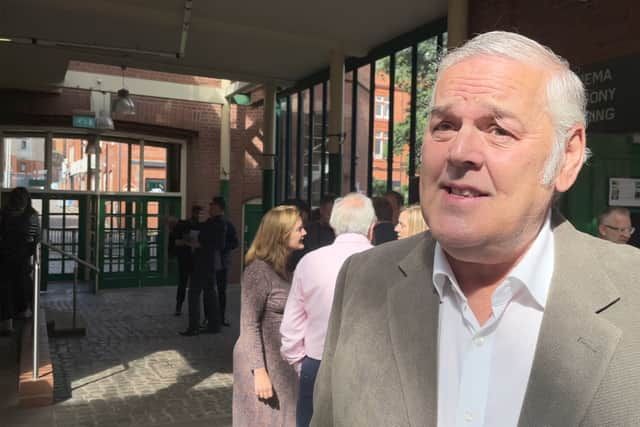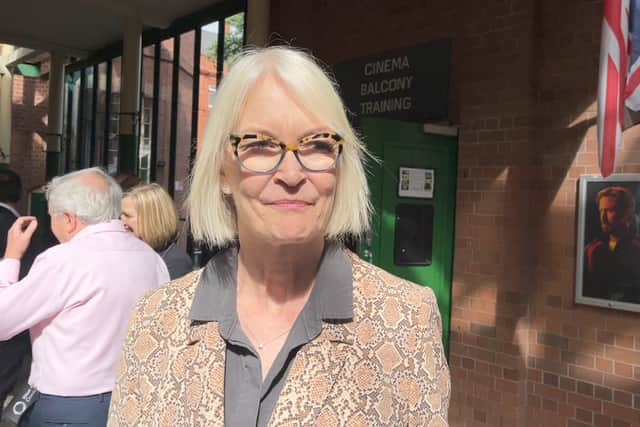West Midlands economy shrinks by 11% in pandemic - while London sees growth
This article contains affiliate links. We may earn a small commission on items purchased through this article, but that does not affect our editorial judgement.
and live on Freeview channel 276
The true scale of the impact of Covid has become apparent in the West Midlands where the economy has shrunk by 11%.
The decline in 2020 has been blamed, in part, on the region’s large automotive sector and high number of exporting companies.
Advertisement
Hide AdAdvertisement
Hide AdAnd, despite having the highest level of Foreign Direct Investment outside London and a strong track record in getting people back into work, the regional economy was still 8% smaller at the end of last year than at the onset of Covid.
The figures have been revealed as London recorded a 1.2% growth in the first three months of 2022 - the highest of any UK region and outstripping the national average of 0.8%.
The West Midlands Combined Authority has responded to the stark decline by launching a plan to recapture the region’s pre-pandemic success.
In 2019 the West Midlands was the fastest growing region outside London, breaking through the £100 billion economic output mark.
Advertisement
Hide AdAdvertisement
Hide AdBusiness and political leaders gathered at the Light House in Wolverhampton to discuss their Plan for Growth aimed at bringing about a resurgent West Midlands today (Thursday, July 7).


What is in the plan to re-ignite the West Midlands economy?
The roadmap focuses action on igniting eight economic clusters where the region already has a competitive advantage and in which businesses are confident to invest.
It shows how, with the right interventions, growing clusters such as electric vehicle manufacture, health and medical technology and construction, can be supercharged to help grow the West Midlands economy by more than £3bn, creating up to 45,000 new jobs.
The Plan proposes combining the power of the private and public sectors around eight clusters:
- The manufacture of electric vehicles and battery storage devices
- Modern and low carbon utilities such as solar and wind power technology
- Logistics and distribution
- The manufacture of the low carbon, factory-built homes of the future
- Professional and financial services
- Health and medical technology
- Aerospace
- Creative content production and video gaming
Advertisement
Hide AdAdvertisement
Hide AdThe plan sets out a number of actions to support the eight clusters. On the manufacture of electric vehicles and battery storage it points to:
- Securing a new Gigafactory at Coventry, including energy networks and site support
- An accelerated roll out of EV infrastructure, including charging
- Support for supply chain transition and diversification, including the circular economy
It says the actions set out for this cluster alone have the potential to boost output by £850m - £950m by 2030 and create a further 11,200 to 12,400 skilled jobs.


Who has drawn up the West Midlands recovery roadmap?
The roadmap has been drawn up by leading private sector figures working with the West Midlands Combined Authority (WMCA), local councils, universities and colleges,
The Plan flags the critical partnerships needed to secure a growing economy that is both environmentally cleaner and fairer to communities and highlights the crucial role of the private sector, working alongside public authorities, in creating the right conditions for investment and prosperity.


Has anything been done to help the economy already?
Advertisement
Hide AdAdvertisement
Hide AdThe audience heard how the WMCA and its partners were already laying the foundations for future success by investing more than £2bn in new transport, housing and skills schemes, using the UK Shared Prosperity Fund, CRSTS, Community Renewal Fund and other funding pots to drive growth and by securing new investment through an Innovation Accelerator.
Some of the region’s most innovative companies operating in the eight priority clusters were also on hand at the event to showcase their cutting-edge products.
These included Coventry-based Skyfarer who are developing drones capable of delivering medical supplies and other items, WM5G which has a 5G enabled camera in a pill that can detect bowel cancer without the need for an invasive endoscopy and WMG which showcased a robotic dog to demonstrate its research into automated manufacturing systems.


What has West Midlands Mayor Andy Street said about the West Midland recovery play?
Andy Street, Mayor of the West Midlands and chair of the WMCA, said: “It’s really simple. It’s acknowledging that the West Midlands had a tough time from Covid, and it’s answering the question - how are we going to get back to the winning ways we had before covid?
Advertisement
Hide AdAdvertisement
Hide Ad“The West Midlands was very much the engine room driving a thriving UK economy pre pandemic but there’s no hiding the harsh impact Covid has had on us.
“Our natural strengths in exporting and manufacturing - particularly in automotive - have been hardest hit by recent challenges so it’s no surprise we have more economic ground to make up than many others as we regain our momentum.
“That’s why the private and public sectors have come together to set out a clear path for strong, clean and inclusive growth. Our focus is on driving investment to generate high value jobs and quality opportunities for local people that buildon our traditional strong suits whilst looking to the growth sectors of the future.
“It must be a joint effort because while the public sector can use and is using its powers and funding to help lay the foundations for growth - think transport infrastructure, housing, urban regeneration and skills training - it will be the private sector that follows on with much greater investment and really drives delivery. Together, we will ensure we bounce back as a region.”


What have West Midlands experts said about the plan?
Advertisement
Hide AdAdvertisement
Hide AdMargot James, executive chair of WMG, which seeks to drive innovation in applied science, technology, and engineering and represents the cluster for manufacturing of electric vehicles, added: “Well I think that the innovations that are at the heart of Midlands manufacturing are really the future of our improved productivity as a region, better jobs and the attraction of more investment.
“The West Midlands is fortunate to have public and private sector leadership which understands the big issues facing our region and has come together to develop a clear, long-term plan that is focussed wholeheartedly on making the changes we need to transform our economy.
“I’m pleased that the Plan for Growth has such a strong focus on the innovation, skills, infrastructure and supply chains needed for these eight clusters including, of course, for the electrification of the automotive cluster, which is already seeing significant private sector investment for future growth.”
A message from the editor:
Thank you for reading. BirminghamWorld is Birmingham’s latest news website, championing everything that is great about our city - reporting on news, lifestyle and sport. We want to start a community among our readers, so please follow us on Facebook,Twitter and Instagram, and keep the conversation going.
Comment Guidelines
National World encourages reader discussion on our stories. User feedback, insights and back-and-forth exchanges add a rich layer of context to reporting. Please review our Community Guidelines before commenting.